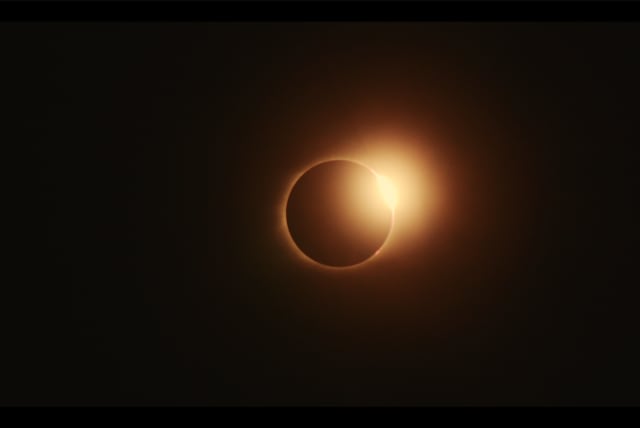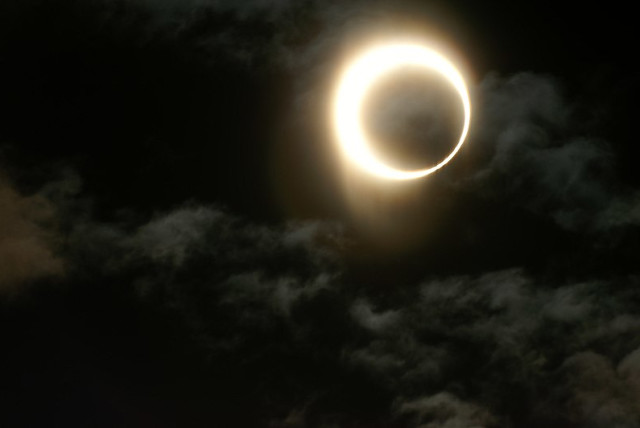Total solar eclipse: What is it, where is it, and why is it dangerous to look at it? - explainer

Total solar eclipses are rare, not often occurring in the same place for a very long time. What makes it special? Why can't we look directly at it? Here's what you should know.
A total solar eclipse is set to cross over North America on Monday, April 8, treating the US, Canada, and Mexico to the haunting sight of the light of the Sun being blocked by the Moon as it passes over.
Of course, one shouldn't look directly at it - it's dangerous.
Regardless, the sight of a total solar eclipse is a rare one; they only happen every so often, and they aren't visible everywhere. In particular, this one will be perfect for North America, but those of us abroad won't have such luck.
But what exactly is a total solar eclipse? What makes it dangerous? Where is the best place to watch it?
Here's everything you need to know.
What is a total solar eclipse?
Eclipses have happened throughout human history, and they have often been ascribed numerous supernatural explanations - indeed, even Judaism has had some ominous words about them, with the renowned medieval rabbinic commentator Rashi saying an eclipse was a bad omen for the world
But these are natural events, purely in the realm of science, and we know exactly why they happen.
A solar eclipse happens when the orbit of the Moon around the Earth sees it cross between the Earth and the Sun. This causes the Moon to essentially block the Sunlight.
Sometimes, only part of the Sun's light gets blocked - this is what is known as a partial solar eclipse. But sometimes, all of the Sun's light gets blocked by the Moon - a total solar eclipse.
Now, this might be a bit confusing at first. How can the Moon block the Sun? Isn't the size difference too much?
And that's correct. The Moon can't block the Sun. It can only block a small amount of Sunlight, relative to the size of the Moon. This big Moon-shaped shadow is called the totality, and it moves around the Earth as the Moon and Earth both move.
This is why total solar eclipses aren't visible everywhere, and only in certain places. Only specific areas will be within this totality.
Why should you not look directly at a solar eclipse?
There are many myths regarding the dangers of solar eclipses. Some say looking directly at a solar eclipse will cause damage to pregnant women, others say it can even poison food.
This is all untrue, but make no mistake - you should absolutely not look directly at a solar eclipse.
The reason for this is because, for one thing, you shouldn't be looking directly at the Sun anyway.
The Sun is extremely bright - so much so that the human eye can't properly handle the sheer amount of power it emanates. Our eyes process light by having the lenses of our eyes focus it to the retina. This is similar to a magnifying glass, the light bending and focusing into the retina.
But that's just for indirect Sunlight. Sunlight straight from the source is so strong that focusing it could basically burn the retina. Since the retina is made of nerve tissue, it doesn't repair itself like other parts of the body, meaning this is one Sunburn that won't get better.
And that's just on a normal day. It's actually much worse during a solar eclipse.
The human eyes adjust to the dark by having the pupils dilate. This lets more light come into your eyes when there is less light available. During a solar eclipse, the sky turns dark, and your pupils will naturally dilate as a result.
When the Sun is totally blocked by the Moon, it is technically safe to look with your bare eyes, though still not advised. If you do, you will be treated to the Moon seemingly encircled by a ring of white or green light. It's beautiful, it's haunting, and it absolutely should not be looked at for any longer.
Because when this short period ends, Sunlight will start coming back fast (it's called the speed of light for a reason). In that instant, your pupils will not have time to adjust, and all that powerful Sunlight will go right through your dilated pupils, making the damage severe and sudden.
Now, does that mean you can't see the solar eclipse at all? No, it's still possible. There are a number of indirect viewing methods that are safe to use, and you can always buy eclipse glasses (think extremely powerful Sunglasses - regular Sunglasses will not suffice) for safe viewing.
Does an eclipse mean the world is about to end?
No, of course not. Though some religious texts may beg to differ.
There is plenty in Judaism and Christianity pointing to the eclipse meaning the End of Days. However, all of that is rather pointless since eclipses don't happen everywhere.
So make no mistake, this is no apocalypse. It's just the Moon getting between the Earth in the Sun in the never-ending cosmic tango that is the heliocentric orbit.
When does the eclipse start?
According to CBS data, the total eclipse is set to start in the South Pacific, and the path of totality will first hit Mexico at around 11:51 a.m. EST. It will then move up into Texas, specifically over Eagle Pass at 1:10 p.m. EST. From there, it will keep crossing through Oklahoma and Arkansas, eventually going to Ohio and then New York, followed by Vermont, New Hampshire, and Maine. Then it's off to Canada.
Not every place will have complete totality. Some, like Mazatlán in Mexico, Dallas in Texas, Cleveland in Ohio, and Burlington in Vermont will get the totality. Others will only have a near-total eclipse, such as New York City, Boston, and Detroit.
The totality is very short, with NASA predicting the longest totality to have a length of 4 minutes and 28 seconds near the Mexican locality of Torreón.
For those of us in Israel, there will be no eclipse to speak of. In fact, for those of us in Jerusalem, there won't be a total solar eclipse until August 8, 2241.
So we have quite a long wait.
Jerusalem Post Store
`; document.getElementById("linkPremium").innerHTML = cont; var divWithLink = document.getElementById("premium-link"); if (divWithLink !== null && divWithLink !== 'undefined') { divWithLink.style.border = "solid 1px #cb0f3e"; divWithLink.style.textAlign = "center"; divWithLink.style.marginBottom = "15px"; divWithLink.style.marginTop = "15px"; divWithLink.style.width = "100%"; divWithLink.style.backgroundColor = "#122952"; divWithLink.style.color = "#ffffff"; divWithLink.style.lineHeight = "1.5"; } } (function (v, i) { });

